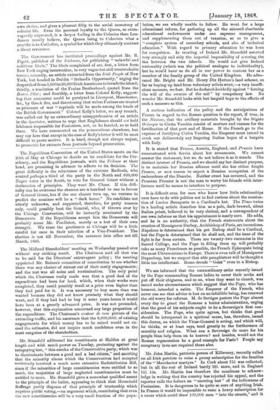Mr. Stansfeld addressed his constituents at Halifax at great length
and with much power on Tuesday, protesting against the ratepaying test, " this eureka of the Conservative party, which was to discriminate between a good and a bad citizen," and asserting that the minority clause which the Conservatives had accepted necessarily involved a much more extensive Redistribution Bill, since if the minorities of large constituencies were entitled to so much, the majorities of large neglected constituencies must be entitled to more. Mr. Stansfeld gave a somewhat qualified assent to the principle of the ballot, appearing to think that Household Suffrage partly disposes of that principle of trusteeship which requires public voting,—an argument which, considering that even the new constituencies will be a very small fraction of the popu-
lation, we are wholly unable to follow. He went for a large educational reform, for gathering up all the misused charitable educational endowments under one supreme management, and supplementing them out of taxation, so as to give a " complete system of secondary schools, and also of technical education." With regard to primary education he was keen for compulsion. In treating of Ireland Mr. Stansfeld asserted very strongly and ably the imperial impossibility of severing the ties between the two islands. He would not give Ireland nationality (which was the political analogue to individuality), but he would have us do all in our power to content her as a member of the family group of the United Kingdom. He advo- cated Mr. Bright and Mr. Henry Dix Hutton's land scheme, so far as buying up land from voluntary selleis went,—a very insuffi- cient measure, we fear. But he declared decidedly against " forcing the will of the owners of the soil " by compulsory law. No wonder Mr. Stansfeld looks with but languid hope to the effects of such a measure as this.






























 Previous page
Previous page